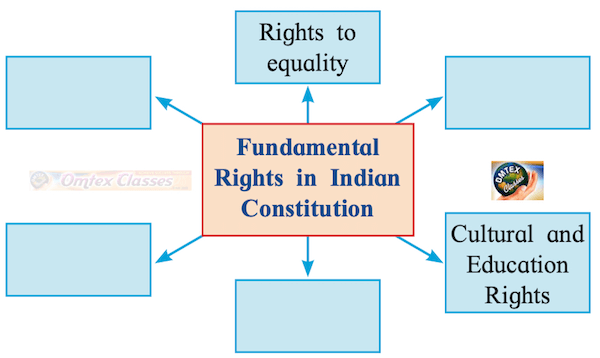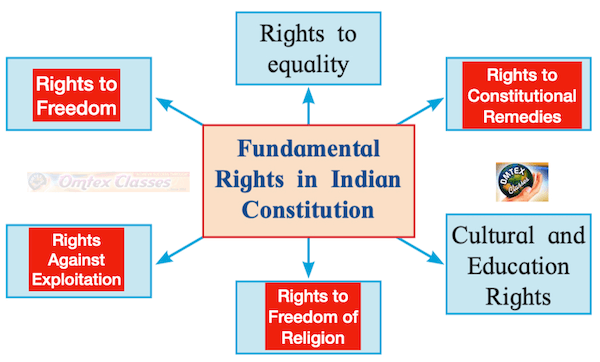Chapter 2: Liberty and Rights
Choose the correct alternative and complete the following statement.
The book, ‘On Liberty’ was written by______.
OPTIONS
Robert Nozick
Thomas Hobbes
J. S. Mill
Isiah Berlin
The concept of Swaraj was spelt out by ______.
OPTIONS
Mahatma Gandhi
Mahatma Phule
Dr. Ambedkar
Dr. Rajendra Prasad
Complete the following sentence by using appropriate reason.
According to Jeremy Bentham, the State should not bring any obstructions in liberty because -
OPTIONS
State does not give liberty.
individual knows how to protect his own interests.
liberty is a hurdle-less situation.
SOLUTION
According to Jeremy Bentham, the State should not bring any obstructions in liberty because individual knows how to protect his own interests.
State the appropriate concept for the given statement.
Fundamental right introduced in Constitution of India by 86th Amendment -
SOLUTION
Fundamental right introduced in Constitution of India by 86th Amendment - Right to education.
Rights based on the conscience of the individual and the community -
SOLUTION
Rights based on the conscience of the individual and the community - Moral rights
Complete the concept map.

SOLUTION
State whether the following statement is true or false with reasons.
Legal rights are not universal.
OPTIONS
True
False
SOLUTION
This statement is True.
Reason: Legal rights include political and civil rights which are granted by the State to the people. Legal rights are codified in law. Different countries grant different rights to their people. Hence, unlike natural rights, legal rights are not universal.
Explain correlation between the following.
Positive liberty and Negative liberty.
SOLUTION
Positive liberty and Negative liberty are two aspects of liberty that have their origin in liberalism. Negative liberty emerged from classical and neoclassical liberalism and finds expression in the views of thinkers like Jeremy Bentham, John Stuart Mill, Robert Nozick, Friedrich Hayek, and Isaiah Berlin. Negative liberty opposes all restraints on liberty i.e., the State should not interfere in the social, economic life of the individual. It opposes any coercion, interference, or force on part of the State. The base of the negative aspect of liberty is the freedom of thought. Bentham argues that every person knows how to protect their own interest and hence no obstruction should be brought by the State. John Stuart Mill suggests that negative liberty should be rejected only if it adversely impacts society. Hayek described liberty as a hurdle less situation while Nozick suggested that the individual should be free from social, economic, and State restrictions. Berlin explains that negative liberty is opposition to restraints on the choice of alternatives. Positive aspects of liberty as advocated by Jean-Jacques Rousseau and Herbert Marcuse emerged from modern liberalism. It states that liberty affects equality and justice. The law guides the individual towards the enrichment of their personality. Rousseau advocated the idea of State control over the individual since the State is a sovereign power that represents the 'General Will'. Similarly, Marcuse advocates State interference and collective control as essential in community life.
We can conclude in the two statements of Isaiah Berlin.
The negative aspect of liberty- 'I am slave to no-man'.
The positive aspect of liberty - 'I am my own master'.
Natural rights and Legal rights.
SOLUTION
According to Harold Laski, 'Rights are those conditions of social life without which no man can seek, in general, to be himself at his best'.
Rights may be classified as natural rights, moral rights, or legal (civil-political) rights.
Natural Rights e.g., right to life, are parts of human nature and reason. They are not dependent on the laws of any government or the customs of any culture. They are universal and inalienable. They are considered beyond the authority of any government or international body to dismiss. The idea of human rights is closely related to that of natural rights. In the United States Declaration of Independence, natural rights mentioned are 'Life, Liberty, and pursuit of Happiness'. Our natural rights as human beings include being treated justly regardless of race, religion, gender, region, etc.
John Locke and Thomas Hobbes strongly advocated natural rights. Natural rights are important because without them we would have no claim to freedom.
Legal rights refer to rights according to law. These rights are granted by the State to the people and exist differently in different countries. They are justiciable and codified in law. Such rights are neither universal nor inalienable. The legal rights include civil rights and political rights.
Short note
Explain Mahatma Gandhi’s idea of liberty.
SOLUTION
Mahatma Gandhi accepted the concept of Swaraj as liberty. He spelt this out in his work, 'Hind Swaraj'. The term Swaraj implies a combination of two ideas: Self (Swa) and Rule (Raj). Thus Swaraj means Self-Rule. Gandhiji's concept of Swaraj was comprehensive. He did not accept Swaraj only as freedom from British rule but also as freedom from western cultural domination. Swaraj would mean freedom from the trampling of humanitarian values. This concept gives more importance to self-governance, self-discipline, and human values.
Discuss the concept of Human Rights.
SOLUTION
Human Rights are those rights that we are entitled to simply because we are human beings. Henry Thoreau first described natural rights as human rights. These are basic rights of people anywhere in the world to be free from exploitation, injustice, and want, to lead a dignified existence, and to develop to the fullest extent. The U.N.O adopted the Universal Declaration of Human Rights (U.D.H.R) on 10th December 1948. These rights are dynamic i.e., they develop with changing times. U.D.H.R expresses belief in the liberty and equality of human beings and promotes the culture of peace and cooperation.
Human rights can be classified as
Civil and Political rights - These are liberty oriented rights like the right to freedom of thought, right to vote, etc
Social, Cultural, and Economic rights - These include the right to social justice, right to work, etc.
Developmental rights - These are linked to the concept of fraternity e.g., the right to a healthy environment, right to information.
The implementation of human rights requires favourable political, socio-economic conditions in the state. In the absence of such, these rights may be violated or denied as happens in the case of women, children, displaced persons, minorities, etc.
Explain Isiah Berlin’s concept of Liberty.
SOLUTION
Isaiah Berlin in his famous essay, 'Two Concepts of Liberty', discussed about Negative and Positive liberty. He believed that liberty is unrestrained. According to Isaiah Berlin, freedom of action is negative liberty. As per this principle, the opportunity to act is important while the action itself is secondary. According to him, the impact of the action is not considered important and hence it is not measured. Therefore, this principle does not give importance to quality. For example, this concept does not make a qualitative difference between choosing one's education, profession, or suffer deprivation. He would rather give importance to give the opportunity to do these actions than the outcome of the action itself.
Isaiah Berlin has mentioned the following features of negative liberty.
Individual should have complete freedom of choice. He should not have restraints on the choice of alternatives. Opposition to such restraints is a feature of negative liberty.
Negative Liberty is based on Neoliberalism.
Answer the following in detail with reference to the given points.
Elaborate the concept of Rights -
Meaning and classification of rights
Legal rights
Human Rights
SOLUTION
1. Meaning and Classification of Rights: Rights are those social conditions that are necessary for the development of our personality. Laski defines rights as 'those conditions of social life without which no man can seek, in general, to be himself at his best'.
Natural Rights -These rights are universal in character e.g. the right to life and liberty.
Moral Rights - These rights are based on the conscience of the person and the community e.g. respect for elders.
Legal Rights - These rights are granted by the state and are codified in law. These rights are not universal. Light rights may be :
Civil rights: related to the person and property of the individuals right to liberty, equality, property
Political rights: are available only to citizens in a democratic State and aim to encourage active political participation e.g. the right to vote, to contest elections.
2. Legal Rights: These rights refer to rights according to law. These rights are granted by the State to the people and exist differently in different countries. They are justiciable and codified in law. Such rights are neither universal nor inalienable. The legal rights include civil rights and political rights.
3. Human Rights: These rights are those rights that we are entitled to simply because we are human beings. Henry Thoreau first described natural rights as human rights. These are basic rights of people anywhere in the world to be free from exploitation, injustice, and want, to lead a dignified existence, and to develop to the fullest extent. The UNO adopted the Universal Declaration of Human Rights on10th December 1948. These rights are dynamic i.e. they develop with changing times. UDHR expresses a belief in the liberty and equality of human beings and promotes a culture of peace and cooperation.
Human rights can be classified as
Civil and Political rights - These are liberty oriented rights like the right to freedom of thought, right to vote, etc
Social, Cultural, and Economic rights - These include the right to social justice, the right to work, etc.
Developmental rights - These are linked to the concept of fraternity e.g. right to a healthy environment, right to information. The implementation of human rights requires favourable political, socio-economic conditions. In the absence of such, these rights may be violated or denied as in the case of women, children, displaced persons, minorities, etc.
4. Civil Rights: These rights are personal rights of the individual according to reasonable limits laid down by the law. This includes universally recognized rights like the right to
Freedom of thought and expression.
Freedom of religion, conscience, and worship
Freedom of movement, association, and assembly
Freedom from fear and want.
5. Political Rights: These rights are available only to citizens in a democracy. They include
right to vote
right to stand for elections
right to hold public office
right to hold public views and to criticize the government.
Balbharati Solutions for Political Science 11th Standard Maharashtra State Board Chapterwise List - Free
The answers for the Balbharati books are the best study material for students. These Balbharati Solutions for Political Science 11th Standard Maharashtra State Board will help students understand the concepts better.
• Chapter 2: Liberty and Rights
• Chapter 3: Equality and Justice
• Chapter 4: Constitutional Government
• Chapter 5: Concept of Representation
• Chapter 6: Role of the Judiciary
• Chapter 7: Public Administration
• Chapter 8: Development Administration
• Chapter 9: The world since 1945 - 1
• Chapter 10: The world since 1945 - 2
Balbharati Solutions for Class 11th Standard FYJC Maharashtra.
Organisation of Commerce and Management (OCM)
...
